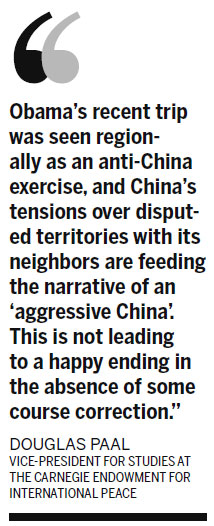When senior officials from China and the United States sit down for the 6th China-US Strategic and Economic Dialogue (S&ED) in early July, they will have to sort out a wide range of economic and security issues, including the recent tensions in the South China Sea.
 |
| Territorial Disputes in the S. China Sea |
Analysts said China left no doubt that it was warning the US to abandon "hypocrisy" and to stop publicly backing countries such as Vietnam and the Philippines on issues regarding China's sovereign territory.
Foreign Minister Wang Yi told Kerry in a phone call that China wanted the US to "stop fueling provocations by relevant parties".
China also urged the US to "stand firmly by its previous commitments, be cautious in words and actions" and observe the maritime situation around China in "an objective and fair manner", Wang said.
Kerry said the US had no intention of judging when it came to the sovereignty of a territorial issue and Washington hoped that all parties concerned handled issues properly and maintained the peace and stability of the region.
Douglas Paal, vice-president for studies at the Carnegie Endowment for International Peace, believes the Obama administration's China policy is drifting with the currents. "This is leading to an increasing emphasis on competition and rhetorical confrontation, and less on cooperation," he said. "It will take a stronger effort than we have seen in the past year for the administration to summon a statement of its fundamental strategy, and how the various details fit together within it."
Paal said the two sides need to get a better understanding of where each is going in the Asia-Pacific region.
"Obama's recent trip was seen regionally as an anti-China exercise, and China's tensions over disputed territories with its neighbors are feeding the narrative of an 'aggressive China'. This is not leading to a happy ending in the absence of some course correction," he said.

Jia Duqiang, an expert in Southeast-Asian studies at the Chinese Academy of Social Sciences, said Vietnam and the Philippines, under the shelter of the US, were provoking China to see if it would be intimidated by pledges made by Washington.
China says Vietnam sent 36 vessels, including warships, into waters off Zhongjian Island in China's Xisha Islands from May 3 to 7 to harass a Chinese oil rig's drilling operations, and they deliberately rammed Chinese boats more than 170 times.
China also says that the Philippines charged nine Chinese fishermen on Monday on charges of catching endangered sea turtles after seizing them in waters off China's Banyue Reef. China has demanded their immediate release.
Foreign Ministry spokeswoman Hua Chunying said on Tuesday that some countries had acted provocatively in the South China Sea in recent days, but China was not one of them.
If Washington truly hoped for peace in the Pacific Ocean, it should rethink how it should function and how it could ensure peace and stability in the region, she said.
The Daily Tribune, a Philippine newspaper, criticized the country's President Benigno Aquino in a Monday editorial, saying he "chose to take the US-prescribed path of agitating China to further substantiate the superpower's Asian pivot policy".
On Tuesday, the US State and Treasury departments announced that 6th session of US China S&ED will be held in Beijing in early July.
Kerry and Treasury Secretary Jacob Lew will be joined by their respective Chinese co-chairs, State Councilor Yang Jiechi and Vice-Premier Wang Yang, along with other senior Chinese and US officials.
The dialogue will focus on addressing the challenges and opportunities that both countries face on a wide range of bilateral, regional and global areas of immediate and long-term economic and strategic interest. It will follow up on talks Kerry had in Beijing in February and that Lew had with Chinese leadership this week in Beijing, according to a State Department press release.
In Beijing on Tuesday, Lew met Chinese Premier Li Keqiang and other senior officials, to discuss a host of economic issues, including the Chinese currency exchange rate.
Zhu Guangyao, vice-minister of finance, said the recent falls of the yuan against the US dollar are entirely based on market forces and China would not bow to US pressure over its currency's recent depreciation.
The yuan has fallen by 2.9 percent against the US dollar since January 1, after appreciating by about 35 percent since 2005.
Zhu said a "two-way movement" had been the consensus of China and the US, as it reflected market forces and could avoid speculation.
Lew told media before and during his trip to Beijing that he had noted the depreciation of the yuan in recent months.
